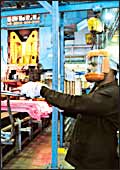 |
| AT PAR WITH THE BEST: Plants such as Bharat
Forge's Pune unit have helped India join the global auto comp
race |
What
makes a successful automotive company-one that boasts fatter margins,
higher profitability and more rapid revenue growth than many of
its industry counterparts? One way to answer that would be to take
names-for instance, compare a Honda with, say, a Kinetic, or a Maruti
to a Fiat-but then there would be too many names to take. Suffice
it to say that a financially flourishing auto manufacturer would
have a better product, or rather, a virtually endless stream of
better products. Sure, advertising, promotions and distribution
will matter too, but then, a car isn't exactly soap: Products aren't
generic (at least they shouldn't be), and there's plenty of room
for differentiation and innovation. Forget what Henry Ford said-the
customer doesn't want only black. She wants choice-and not just
of colour.
So put the customer at the heart of the matter,
and you don't have to be a genius to figure what goes into a successful
auto manufacturer-superior quality, a variety of products, which
are either affordable and reliable, or the neighbour's envy. Turn
that into manufacturer-speak and you're talking about: A superior
product development strategy, a pronounced focus on new product
introductions (NPIs), a significant investment in research &
development (R&D), and an almost fanatical obsession with cost
reduction, which will call for such diverse measures ranging from
increased outsourcing to optimum use of in-house capacities.
That's exactly what some of India's best auto
manufacturing companies are pursuing, when they're making either
cars or commercial vehicles or two-wheelers or ancillaries or even
forgings. Talk to any senior plant executive of any automotive firm,
and chances are that there will be three recurrent themes in his
conversation: Cost-reduction, quality improvement and NPIs. And
there's ample scope for all of them. Keeping costs under control
is imperative not just to increase margins, but to ride out the
rough times, of which the cyclical automotive industry has seen
plenty of.
One surefire way to reduce costs is to increase
outsourcing from vendors, whilst at the same time rationalising
the number of vendors to a more manageable number. This not only
helps keep material costs down and realise better economies of scale,
a fewer number of vendors will also help manufacturers standardise
processes and pursue productivity improvements more easily. To be
sure, the best manufacturers today outsource close to three-fourths
of their materials, with only key elements like engines, axles and
gear-boxes made in-house.
Quality improvement is a no-brainer, given
the huge gap that exists in some segments, particularly heavy commercial
vehicles, between domestic production and global standards. If Indian
companies want to sell their products in developed nations-as a
few of them have professed that is their global vision-they have
to make products that are on a par with the world's best, products
with stronger frames, lighter springs, and slicker painting, styling
and aesthetics. Can you, for instance, imagine the Tata "Horn
OK" truck of today on European or American roads! What's more,
with many of the international players bringing in advanced products
into the country, just as Volvo has done in the bus segment, the
established domestic players have to respond accordingly. True,
Volvo may be low on volumes today, but it's very high on visibility,
has set new standards in customer expectations, and it's only a
matter of time before the Volvo's superior roadholding features,
suspensions and roll stabilisers become a norm rather than the exception.
Clearly, there's plenty of such work that's
taking place, right from design to manufacturing, at outposts like
the Tatas' Engineering Research Centre (ERC) on the outskirts of
Pune. One such product out of the ERC, the one-tonne pick-up, will
be sold by Rover of the UK in that region. Meantime, all-Indian
two-wheeler makers like Bajaj Auto and TVS are making in-house R&D
result in a steady stream of new products. At Bajaj Auto, increased
R&D on new products-like the best-selling Pulsar and the soon-to-be
launched Discover-is resulting in the new offerings accounting for
revenue that's many times the R&D spend. Ditto with TVS, whose
demise was proclaimed far and wide after its break-up. Post-split
in the late nineties, TVS has launched close to 25 products, all
developed in-house. Needless to say, TVS hasn't yet died.
TVS, of course, will still lack the engineering
finesse of a Honda, and an Indica may still not be in the league
of global small cars, but the good news is they're getting there-and
all the ingredients needed to get there to exist in the country-a
low-cost, quality-driven worker base and more importantly the wealth
of engineering talent available. That could explain why Toyota has
identified India as a sourcing base for manual transmissions-the
only such hub outside of Japan. Even as India's best auto companies
attempt to bridge the gap between international quality and domestic
promise, the global auto giants are exploiting the local potential
to match their overseas standards. Read on to find out how.
|
